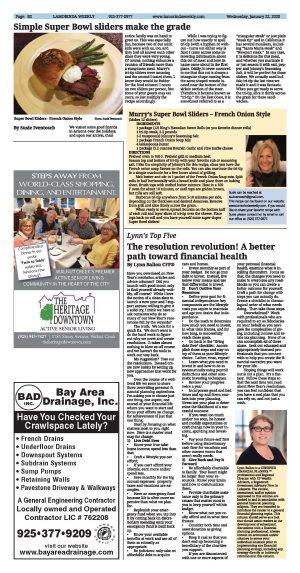| | Published January 22nd, 2020
| Lynn's Top Five
| | The resolution revolution! A better path toward financial health | | By-Lynn-Ballou-CFP |  | | Lynn Ballou is a CERTIFIED FINANCIAL PLANNER � professional and Regional Director with EP Wealth Advisors, a Registered Investment Advisory Firm in Lafayette. The review, assessment, and/or opinion expressed in this column are limited to and in association with general financial planning subjects. They are intended to introduce the reader to a general financial planning topics. This column should serve as a tool that should assist readers in the development of subsequent discussions with a financial planning professional. Always consult an accountant and/or attorney to assess your individual situation prior to implementing any financial planning strategy, including any strategy directly or indirectly referenced in this column. |
Have you overdosed on New Year's resolution articles and advice columns? Did you launch with good intent only to find yourself already wobbly, off course? While I love the notion of a clean slate to launch a new year and I support anyone willing to give it a solid try, I think we have to ask ourselves why do so many of our New Year's resolutions fall by the wayside?
 The truth: We look for a quick fix. We don't want to do the hard work to figure out why we covet and create resolutions. It takes almost nothing to blow us off course and we haven't the tools to work our way back.
The truth: We look for a quick fix. We don't want to do the hard work to figure out why we covet and create resolutions. It takes almost nothing to blow us off course and we haven't the tools to work our way back.
 My suggestion? Toss out the resolutions. Instead create new habits by setting up new approaches that work for you.
My suggestion? Toss out the resolutions. Instead create new habits by setting up new approaches that work for you.
 Over the course of a well-lived life we seem to share three overriding personal financial planning aspirations. I'm asking you to choose just one thing, one aspect, one morsel of your financial life where you want to start and focus your efforts on change for achievement of just that one thing.
Over the course of a well-lived life we seem to share three overriding personal financial planning aspirations. I'm asking you to choose just one thing, one aspect, one morsel of your financial life where you want to start and focus your efforts on change for achievement of just that one thing.
 Start by focusing on what matters most to you, right now. Here is a master road map for change.
Start by focusing on what matters most to you, right now. Here is a master road map for change.
 1) Live Debt Free
1) Live Debt Free
 - Know your true take-home income; spend less than that.
- Know your true take-home income; spend less than that.
 - Craft a lifestyle you can afford;
- Craft a lifestyle you can afford;
 - If you can't afford your lifestyle, earn more and/or spend less.
- If you can't afford your lifestyle, earn more and/or spend less.
 - Save monthly for the big annual expenses: property taxes and vacations are examples.
- Save monthly for the big annual expenses: property taxes and vacations are examples.
 - Have an emergency fund because life is often more expensive than what we plan for.
- Have an emergency fund because life is often more expensive than what we plan for.
 - Replenish your emergency fund when you tap into it by cutting back on discretionary spending until your emergency fund is built back up.
- Replenish your emergency fund when you tap into it by cutting back on discretionary spending until your emergency fund is built back up.
 - Know your available benefits at work and use all of them as robustly as appropriate.
- Know your available benefits at work and use all of them as robustly as appropriate.
 - Be judicious: only take on affordable debt to acquire cars and homes.
- Be judicious: only take on affordable debt to acquire cars and homes.
 - Invest monthly as part of your budget. Do not go into debt to invest. Instead, live below your means and use that differential to invest.
- Invest monthly as part of your budget. Do not go into debt to invest. Instead, live below your means and use that differential to invest.
 2) Don't Outlive Your Resources
2) Don't Outlive Your Resources
 - Define your goal for financial independence: key components are the lifestyle costs you aspire to maintain and age you desire that independence.
- Define your goal for financial independence: key components are the lifestyle costs you aspire to maintain and age you desire that independence.
 - Do the math to determine how much you need to invest, in what time frames, and for how long, to successfully reach those goals.
- Do the math to determine how much you need to invest, in what time frames, and for how long, to successfully reach those goals.
 - Go back to the "living debt free" checklist. Accomplish those steps and stay on top of them as your lifestyle choice. Lather, rinse, repeat!
- Go back to the "living debt free" checklist. Accomplish those steps and stay on top of them as your lifestyle choice. Lather, rinse, repeat!
 - Learn what you need to invest in and how to do so systematically using payroll deductions and other automatic investing techniques.
- Learn what you need to invest in and how to do so systematically using payroll deductions and other automatic investing techniques.
 - Review your progress twice a year.
- Review your progress twice a year.
 - Incorporate good and bad times and up and down markets into your planning. Stress test your plan to determine the likelihood of a successful outcome.
- Incorporate good and bad times and up and down markets into your planning. Stress test your plan to determine the likelihood of a successful outcome.
 - If you want too much and/or too soon, be honest and modify expectations or craft change now in your income, spending and investing.
- If you want too much and/or too soon, be honest and modify expectations or craft change now in your income, spending and investing.
 - Pay your future-self first before using discretionary cash flow for vacations and other current wants that aren't really needs.
- Pay your future-self first before using discretionary cash flow for vacations and other current wants that aren't really needs.
 3) Give Back and Pay it Forward
3) Give Back and Pay it Forward
 - Be affordably charitable to family. Your heart might be larger than your resources. Know your limits and how to communicate them.
- Be affordably charitable to family. Your heart might be larger than your resources. Know your limits and how to communicate them.
 - Provide charitable assistance only to the primary causes that matter most to you to keep yourself within budget.
- Provide charitable assistance only to the primary causes that matter most to you to keep yourself within budget.
 - Know what can you really afford and in what time frames.
- Know what can you really afford and in what time frames.
 - Consider both time and asset donation as giving options.
- Consider both time and asset donation as giving options.
 - Keep it real so that you don't end up becoming a beneficiary of the charities you support.
- Keep it real so that you don't end up becoming a beneficiary of the charities you support.
 If you are discontented with one or more aspects of your personal financial health, examine what is instilling discomfort. Focus on that, the changes you need to make to overcome any roadblocks so you can create a better outcome for yourself. Craft a path for change with steps you can actually do. Create a checklist in chronological order of what needs doing. Then take those steps.
If you are discontented with one or more aspects of your personal financial health, examine what is instilling discomfort. Focus on that, the changes you need to make to overcome any roadblocks so you can create a better outcome for yourself. Craft a path for change with steps you can actually do. Create a checklist in chronological order of what needs doing. Then take those steps.
 Overwhelmed? Work with professionals who are required to act as fiduciaries on your behalf as you navigate the complexities of giving, including income and estate tax planning. None of us can accomplish all of these alone. Seek out educated and appropriately licensed professionals that you connect with to help you create the financial narrative you want for your life.
Overwhelmed? Work with professionals who are required to act as fiduciaries on your behalf as you navigate the complexities of giving, including income and estate tax planning. None of us can accomplish all of these alone. Seek out educated and appropriately licensed professionals that you connect with to help you create the financial narrative you want for your life.
 Hoping things will work out is not a plan. It's a fantasy. Follow these steps so that the next time you read about New Year's resolutions, you can feel confident that you have a real plan that you can rely on, and not just a wish.
Hoping things will work out is not a plan. It's a fantasy. Follow these steps so that the next time you read about New Year's resolutions, you can feel confident that you have a real plan that you can rely on, and not just a wish. |
| | | | | | | | | | | | |



